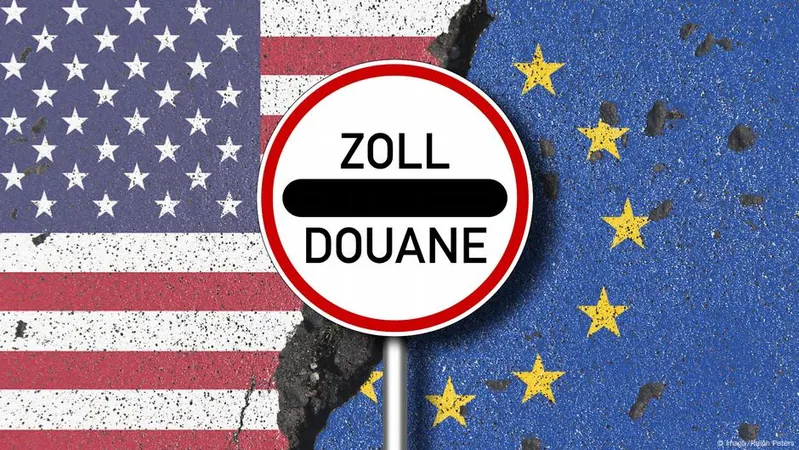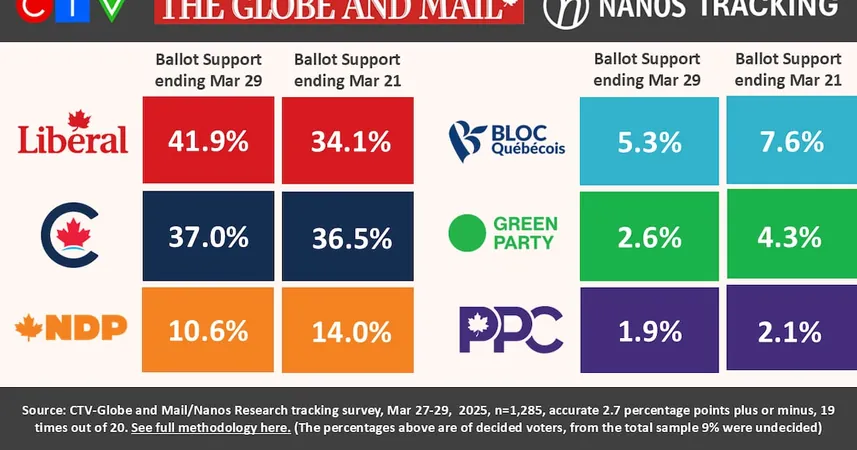
How the EU Plans to Counter Trump's Growing Trade War
2025-03-29
Author: Benjamin
As President Donald Trump continues to champion tariffs as a cornerstone of his economic policy, European leaders find themselves in a precarious position. The European Commission has called Trump's trade policy an "act of economic self-harm" as they prepare a strategic response to his actions that may escalate into a full-blown trade war.
With the threat of a sweeping 20% tariff on all EU goods looming on the horizon, officials in Brussels are acutely aware of the potential ramifications on the cost of European exports to the US. Currently, the EU is already grappling with the impact of the 25% tariffs imposed on steel and aluminum and additional tariffs targeting the automotive sector. The uncertainty surrounding which countries or the EU as a whole will be affected adds to the complexity of the situation.
The EU has a robust set of tools at its disposal to respond effectively while aiming to minimize disruption to European consumers. One significant measure under consideration involves restricting services provided by US companies in Europe.
Targeting US Services
The EU Commission may consider actions that would curtail the operations of major US tech giants. For example, they might restrict the ability of companies like Apple and Google to charge for their services across the EU or prevent firms like Elon Musk’s Starlink from securing government contracts in Europe. This could lead to a considerable economic pushback against US firms, especially in the tech sector, where the EU has less leverage in goods trade but stands to gain significantly by protecting its digital economy.
Trade Dynamics
In 2023, the EU recorded a goods trade surplus of €157 billion (approximately $170 billion) against the US, importing more than it exported. However, in services, the US held a surplus of €109 billion. This complex balance highlights the stakes for both sides involved, signifying that any retaliatory measures must be nuanced and well thought out.
Retaliatory Measures: Balance and Complexity
The EU has thus far responded to earlier tariffs with symbolic measures, targeting US products like Harley Davidson motorcycles and Levi's jeans. However, with those sectors already affected, new tariffs would need to expand their focus. Any retaliatory tariffs require support from a qualified majority of EU nations, making it a politically sensitive issue. For instance, French interests have called for protecting the wine sector from US retaliation, complicating the consensus needed for action.
The Anti-Coercion Instrument: The EU’s “Trade Bazooka”
Another strategic option for Brussels is the newly implemented Anti-Coercion Instrument (ACI), designed to respond to economic pressures from nations like China. This tool provides an array of responses if the EU determines that Trump's tariffs amount to economic coercion, which could include restricting access for US banks, revoking patents, or limiting revenues for online streaming services.
Advocates within the EU, such as former Trade Commissioner Cecilia Malmström, argue for the ACI’s proactive use, which could allow for targeting individuals or companies close to the Trump administration, further escalating tensions.
Scrutiny of Big Tech
In addition to trade tariffs, experts warn that the EU could wield existing legislation to impose harsh penalties on major US tech firms under the Digital Services Act (DSA) and Digital Markets Act (DMA). This could mean significant fines for platforms that fail to manage harmful content effectively. The EU is already scrutinizing concerns about misinformation on platforms like X (formerly Twitter), particularly in the context of upcoming European elections.
Conclusion: A Ticking Time Bomb?
While the EU weighs its options, any aggressive move against US firms could lead to higher tensions, raising concerns for European citizens at large. Economists caution that retaliatory measures could backfire, leading to a volatile economic landscape that might adversely affect both the EU and US economies. As this trade war threatens to escalate, the world watches closely to see how Europe will respond to one of its most crucial economic allies.









 Brasil (PT)
Brasil (PT)
 Canada (EN)
Canada (EN)
 Chile (ES)
Chile (ES)
 Česko (CS)
Česko (CS)
 대한민국 (KO)
대한민국 (KO)
 España (ES)
España (ES)
 France (FR)
France (FR)
 Hong Kong (EN)
Hong Kong (EN)
 Italia (IT)
Italia (IT)
 日本 (JA)
日本 (JA)
 Magyarország (HU)
Magyarország (HU)
 Norge (NO)
Norge (NO)
 Polska (PL)
Polska (PL)
 Schweiz (DE)
Schweiz (DE)
 Singapore (EN)
Singapore (EN)
 Sverige (SV)
Sverige (SV)
 Suomi (FI)
Suomi (FI)
 Türkiye (TR)
Türkiye (TR)
 الإمارات العربية المتحدة (AR)
الإمارات العربية المتحدة (AR)